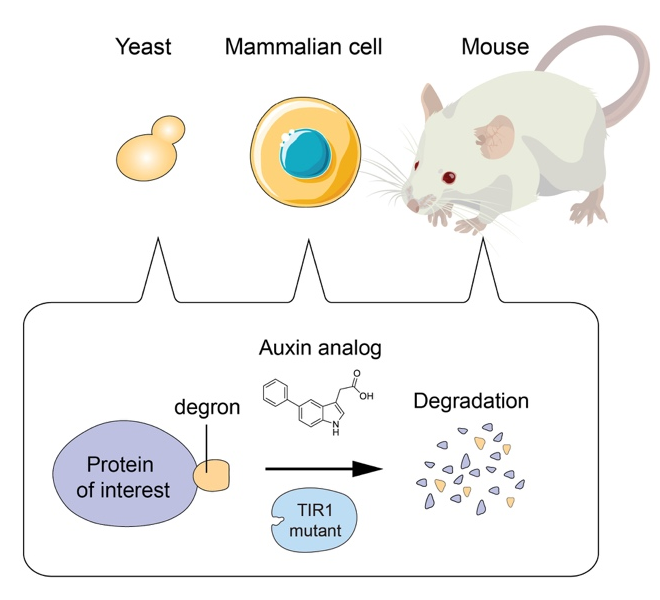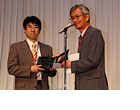NIG website service will be stopped several times. July 11 Thu, 00:00 – July 11 Thu, 08:00.
Due to the facility maintenance, the NIG website service will be stopped several times on the following time.
Thank you for your understanding and cooperation.
Time and Date: July 11 Thu, 00:00 – July 11 Thu, 08:00.
以下の期日において、遺伝研公式ウェブサイトの断続的な停止を伴う保守作業が予定されております。
皆様のご理解とご協力をお願いいたします。
停止日時: 7月11日(木) 00:00~7月11日(木) 08:00
理由: 保守作業のため
Tuesday,February 2,2021
The NIG Webinar: AID2 enables rapid target protein degradation in living mammalian cells and mice
The NIG international webinar by Prof. Kanemaki will be held on February 2nd at 4 pm, Eastern Time (on February 3rd at 6:00 am, Japan Standard Time). He will talk about a new genetic tool that enables rapid and reversible depletion of target proteins in living cells and animals. A Zoom link of the webinar will be obtained by free registration at the following URL (https://rois.zoom.us/meeting/register/tJAudOuprD4oHdV4dRlS6mAIdKX2F-jlAIEJ).
Time and Date:
Eastern Standard Time (EST): 4:00 pm, February 2nd
Pacific Standard Time (PST): 1:00 pm, February 2nd
Greenwich Mean Time (GMT): 9:00 pm, February 2nd
Central European Time (CET): 10:00 pm, February 2nd
Japan Standard Time (JST): 6:00 am, February 3rd
Registration (Zoom URL will be obtained by the free registration):
https://rois.zoom.us/meeting/register/tJAudOuprD4oHdV4dRlS6mAIdKX2F-jlAIEJ
Title:
AID2 enables rapid target protein degradation in living mammalian cells and mice
Speaker:
Prof. KANEMAKI, Masato
Molecular Cell Engineering Laboratory
National Institute of Genetics
Summary:

Genetic perturbation is a powerful way to analyze the function of proteins in living cells. For this purpose, we pioneered to develop the auxin-inducible degron (AID) technology by which a degron-fused protein can be rapidly degraded after the addition of the plant hormone auxin (Nishimura et al., Nat. Methods, 2009). By combining with CRISPR-based genome editing, it was possible to generate AID conditional mutants of human cells (Natsume et al., Cell Reports, 2016). The AID system became one of the popular genetic tools to study the function of proteins. However, leaky degradation and high doses of auxin for inducing degradation have been major drawbacks. Moreover, nobody has successfully applied the AID system to control protein degradation in living mice. We recently overcame these problems by taking advantage of chemical biology and successfully established the AID2 system (Yesbolatova et al. Nature Communications, 2020). By using AID2, we can now sharply control protein degradation in yeast, mammalian cells and mice.
• Link to KANEMAKI laboratory
• EurekAlert! link about the paper, Yesbolatova et al. Nature Communications, 2020
• Link to an interview of Prof. KANEMAKI
Chairperson: MAESHIMA, Kazuhiro
Dr. Hiroki Kokubo received the Chairperson Award of the 3rd Congress of Asia-Pacific Pediatric Cardiac Society.
 Dr. Hiroki Kokubo, Mammalian Development Lab., received the Chairperson Award of the 3rd Congress of Asia-Pacific Pediatric Cardiac Society. The Awarding Ceremony was held in the evening of 7th July from 20p.m. at the Sheraton Grande Tokyo Bay hotel, as part of the 3rd Congress of Asia-Pacific Pediatric Cardiac Society on July 6-8th in Chiba, Japan. Dr. Kokubo gave a lecture titled “Hesr2 disrupted mice develop aortic valve disease with advancing age.
Dr. Hiroki Kokubo, Mammalian Development Lab., received the Chairperson Award of the 3rd Congress of Asia-Pacific Pediatric Cardiac Society. The Awarding Ceremony was held in the evening of 7th July from 20p.m. at the Sheraton Grande Tokyo Bay hotel, as part of the 3rd Congress of Asia-Pacific Pediatric Cardiac Society on July 6-8th in Chiba, Japan. Dr. Kokubo gave a lecture titled “Hesr2 disrupted mice develop aortic valve disease with advancing age.
Chairperson Award: ” Hesr2 disrupted mice develop aortic valve disease with advancing age.”
Information: http://www.appcs.org/2010/















